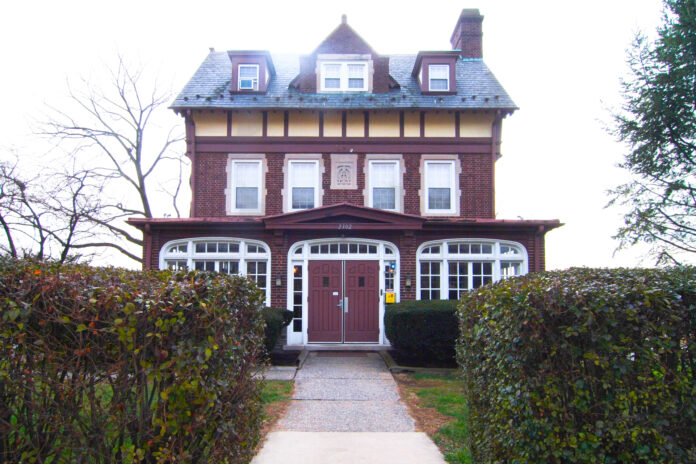The conversation surrounding Greek life at Muhlenberg has always been unique. There is a common idea that since Muhlenberg is a small college, Greek life here is different than at bigger state schools. In order to fully understand this sentiment and if there is reality behind it, I sat down with Patrick Carmody ‘23 and gauged his thoughts on Greek life at Muhlenberg.
Carmody is a member of the fraternity Alpha Tau Omega (ATO) and has served as Academic Chair, Philanthropy Chair, Social Chair and President of ATO during his three years as a member. With such heavy involvement in his fraternity, Carmody was able to gain insight on fraternity life at Muhlenberg, and how it may differ from other colleges. When asked why he originally joined ATO and if he would have joined a fraternity no matter where he went to college, Carmody responded, “I didn’t plan on joining a fraternity when I came to college. Fraternities here aren’t like fraternities at other schools, they’re like, ‘fake fraternities.’ We don’t really have a lot of social power, so it’s more like a group of friends more than anything. It’s not some big construct with the ability to affect social life, like other schools. And it’s not as intense, it’s very ‘laxed.”
Even though Greek life at Muhlenberg is said to be different, the inherent advantages that come with being a member are still true to fraternities and sororities at Muhlenberg. If you can afford the amount of money it costs to be a part of a Greek life organization, the connections that being a part of a fraternity or sorority provide individuals are connections that can carry on to future employment opportunities, or can look valuable on a person’s resume.
“It’s definitely a resume builder. If you want to be involved in a philanthropy, you can do that through Greek life. If you want a leadership position, you can do that. There’s also the classic joke of ‘paying for friends’ and there’s obviously some truth to that. I’ve met people I otherwise wouldn’t have,” said Carmody.
Carmody speaks on the different advantages being a member of ATO were able to provide him, stating, “I didn’t decide to be president, it was more so decided for me. When I started thinking about it, I knew it was good for my resume. The life experience also, I think if I wasn’t president, I would be a lot less prepared for the real world. You have to manage 35 to 40 other people. You have to manage the lease of the house, the rent, you have to manage the money that’s coming in, who gets paid, when they get paid, doing the taxes, managing the guys. It personally prepared me for a lot.”
In order to be a part of a fraternity, there are hundreds of dollars worth of dues you need to pay. This is one of the greatest systemic barriers and disadvantages that come about from Greek life and is intrinsic to fraternities, even at Muhlenberg. Carmody speaks about the semesterly dues members need to pay, saying, “Us [ATO] compared to other fraternities at state schools aren’t too bad, where they have dues of 1,000 dollars a semester. Other fraternities around here are about 800, and [to be a part of ATO it’s] about 400 dollars a semester. And where all that money is going is to nationals. The semesterly dues [start at] 250 dollars a semester, and then they sneak in convention fees that are 1,500 every three months and so we collect local dues, which we collect 150 dollars to pay for.”
Carmody speaks about how the national organization has a heavy hand in how the fraternity operates saying,“[I think] our national organization is one of the worst things that’s ever been created. They just make your life awful. And in 2019, there was a member at Washington State that died from hazing, and the CEO of our fraternity gave an interview for ‘60 Minutes.’ It was one of the most incompetent interviews I’ve ever seen, giving the worst excuses, and not taking accountability for anything.”
Carmody refers to the death of Sam Martinez, a 19 year-old who was pledging ATO at Washington State University in 2019. After attending a Big-Little event hosted by ATO in November of 2019, Martinez was given a half gallon of alcohol, which is the equivalent of 40 shots, by his “big” which caused him to pass away from alcohol poisoning. In wake of this tragic death, Chief Executive Officer (CEO) of ATO’s National Fraternity Organization, Wynn Smiley went on ‘60 Minutes’ and deflected responsibility stating, “When push comes to shove, the pledges can stand up and say no. I don’t want to put that on them, because that wouldn’t be fair.”
A core aspect to fraternity life is hazing, and while it is frowned upon and officially denounced by many organizations, it still continues at many colleges. ATO has had a long history of hazing, and at Muhlenberg, its infamous history has been recorded in a documentary titled, “Frat House” released in 1998, even though ATO and Muhlenberg are not explicitly stated. In 2000, the fraternity had their charter revoked by the College due to hazing allegations in 1999. In more recent history, in 2019, ATO was suspended, again due to hazing related allegations and alcohol violations. When asked if the fraternity continues to haze, Carmody explained, “[We] definitely don’t haze after 2019. Zero tolerance at this point. We have a new member education program, but it’s just meeting the standards nationals want us to hit. So it’s learning the history, the songs we sing and the traditions. But outside of that, we don’t really do anything. We have them do activities together, but those are usually just like, do a scavenger hunt, we’ll do it with you. Or let’s go on a hike together. No one’s forced to do anything.”
“It’s again the difference between fraternities at state schools and here. We go to Muhlenberg College, we don’t need to be doing that. It’s not that intense, we’re basically a club. And it also comes back to, why would you want to do that to anybody? It just doesn’t make any sense. And if you’re willing to do that to someone you’re claiming to be your friend, it gives a bad image of what you are and what you believe in,” he added.
Carmody continued to speak about how ATO’s national organization is where a lot of the deep rooted problems of the fraternity lay. He expresses, “I think the national fraternity is far worse. It’s essentially a pyramid scheme. Because it’s really adults taking advantage of kids being idiots, and kids partying, and monetizing that. And when things go bad, it’s blaming the kids and not the overall organization and it’s just a joke. They love to preach of it being a brotherhood and there are intrinsic values. But if something bad happens, they’ll give an interview and say ‘oh it’s just a business, that was one person doing something bad, that’s not our fault. We just supply the venues, it’s not our problem.’ And there’s obviously something very problematic about that. You can’t play both sides of the coin.”
A main point Carmody articulated was that there are a lot of moving parts to fraternity life, and fraternities at Muhlenberg are considerably different than the ones at larger colleges. He expressed, “We go to Muhlenberg, I’ve said it enough at this point. It’s not that serious, it’s not that intense. [Because of this] I don’t think I would do well at a fraternity at a big state school.”
When asked about the future of Greek life and ATO at Muhlenberg, Carmody expressed, “I think the future of ATO and Greek life in general are looking positive. While some membership numbers may be down I believe the most philanthropic money in a very long time has been raised, so that’s a positive point, and that is something to always improve on.”
Shinam ‘25 is a political science and sociology major at Muhlenberg. She is immensely excited to be apart of the Weekly staff! When she isn’t writing, she can be found reading a book or watching a comfort show with her favorite fast food!























